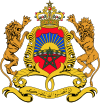| Revision as of 13:55, 18 March 2023 editFreelancer212 (talk | contribs)23 edits →Sub-tribes: I have sorted the tribes, supplemented them (with source, of course) and put them in alphabetical order. As for the Haha and Hintata tribes, I've also included the sub-tribes, which can be found on their own wiki page.Tags: Reverted Mobile edit Mobile web edit Advanced mobile edit← Previous edit | Revision as of 14:28, 18 March 2023 edit undoSimoooIX (talk | contribs)Extended confirmed users1,433 edits Undid revision 1145318645 by Freelancer212 (talk) See talk pageTags: Undo Mobile edit Mobile app edit Android app editNext edit → | ||
| Line 1: | Line 1: | ||
| {{Short description|Berber tribal confederation of Morocco}} | |||
| {{Short description|Berber tribal confederation of Morocco}}{{Infobox tribe|name=Masmuda|local name=''Imasmuden, ⵉⵎⵙⵎⵓⴷⵏ''|type=Group of Berber tribes.|ethnicity=]|location=• ] <br>• ]<br />• ]<br />• ]|parent_tribe=|branches= ], ], ], ].|language=] (])|religion=• ] (predominantly)}} | |||
| {{for|the town and commune|Masmouda, Morocco}} | {{for|the town and commune|Masmouda, Morocco}} | ||
| {{History of Morocco}} | {{History of Morocco}} | ||
| The '''Masmuda''' ( |
The '''Masmuda''' ({{lang-ar|'''المصمودة'''}}, ]: ⵉⵎⵙⵎⵓⴷⵏ<ref>{{cite book | url=https://books.google.com/books?id=R1RBEAAAQBAJ | title=Gramàtica amaziga: Estàndard del diasistema amazic septentrional | isbn=9788491686583 | last1=Múrcia | first1=Carles | last2=Sànchez | first2=Carles Múrcia | year=2021 }}</ref>) is a ] tribal ] of ] and one of the largest in the ], along with the ] and the ].<ref name=locmorocco>{{cite book|last=Nelson|first=Harold D.|title=Morocco, a country study|series=Area handbook series |year=1985|publisher=The American University|location=Washington, D.C.|pages=14|url=http://catalog.hathitrust.org/Record/001298165}}</ref> They were composed of several sub-tribes: ]s, ] (Ghomarids), ]s (]), ]el, Hergha, Genfisa, Seksiwa, Gedmiwa, Hezerdja, Urika, Guerouanes, Bni M'tir, Hezmira, Regraga, Haha les Banou Maghus, Gilawa and others. Today, the Masmuda confederacy largely corresponds to the speakers of the ] (Tachelhit) ] variety, whereas other clans, such as ] have adopted ]. | ||
| ==History== | ==History== | ||
Revision as of 14:28, 18 March 2023
Berber tribal confederation of Morocco For the town and commune, see Masmouda, Morocco.| Part of a series on the |
|---|
| History of Morocco |
 |
| Prehistory |
|
Classical to Late Antiquity (8th century BC – 7th century AD) |
|
Early Islamic (8th–10th century AD) |
|
Territorial fragmentation (10th–11th century AD) |
|
Empire (beginning 11th century AD) other political entities |
|
Decline (beginning 19th century AD) |
|
Protectorate (1912–56) |
|
Modern (1956–present) |
Related topics
|
The Masmuda (Template:Lang-ar, Berber: ⵉⵎⵙⵎⵓⴷⵏ) is a Berber tribal confederation of Morocco and one of the largest in the Maghreb, along with the Zanata and the Sanhaja. They were composed of several sub-tribes: Berghouatas, Ghomaras (Ghomarids), Hintatas (Hafsids), Tin Malel, Hergha, Genfisa, Seksiwa, Gedmiwa, Hezerdja, Urika, Guerouanes, Bni M'tir, Hezmira, Regraga, Haha les Banou Maghus, Gilawa and others. Today, the Masmuda confederacy largely corresponds to the speakers of the Shilha (Tachelhit) Berber variety, whereas other clans, such as Regraga have adopted Arabic.
History
The Masmuda settled large parts of Morocco, and were largely sedentary and practised agriculture. The residence of the Masmuda aristocracy was Aghmat in the High Atlas mountains. From the 10th century the Berber tribes of the Sanhaja and Zanata groups invaded the lands of the Masmuda, followed from the 12th century onwards by Arab Bedouins (see Banu Hilal).
Ibn Tumart united the Masmuda tribes at the beginning of the 12th century and founded the Almohad movement, which subsequently unified the whole of the Maghreb and Andalusia. After the downfall of the Almohads, however, the particularism of the Masmuda peoples prevailed once more, as a result of which they lost their political significance.
Sub-tribes
The author of the book "Mafakhir al-Barbar" (roughly translates as: The prides of the Berbers), cites the sub-tribes of the Masmuda as follows:
Chleuh
- Ait Erkha
- Ait Magus (Beni Magus)
- Ghlawa
- Guedmiwa
- Haha
- Ait Aissi
- Ait Tamer
- Ait Zelten
- Ida Kazzou
- Ida Ou Bouzia
- Ida Ou Guelloul
- Ida Ou Gourd
- Ida Ou Issaren
- Ida Ou Thgoumma
- Ida Ou Zemzem
- Imgard
- Neknafa
- Hintata
- Ait Galga'iya
- Ait Lamazdur
- Ait Tagurtant
- Ait Taklawwuhtin
- Ait Talwuhrit
- Ait Tumsidin
- Ait Wawazgit
- Ait Yigaz
- Mazala
- Henfisa
- Hezerga
- Hezmira
- Ida Ou Tanane
- Ait Tinkirt
- Ait Ouzzoun
- Ifsfaten
- Ksima
- Mesfouia
- Mtouga
- Mzouda
- Ourika
- Regraga
- Saksaoua
- Sektana
- Tehlawa
References
- Múrcia, Carles; Sànchez, Carles Múrcia (2021). Gramàtica amaziga: Estàndard del diasistema amazic septentrional. ISBN 9788491686583.
- Nelson, Harold D. (1985). Morocco, a country study. Area handbook series. Washington, D.C.: The American University. p. 14.
- Nelson 19-20
- Unknown author (1312). كتاب مفاخر البربر. Hassan II university of Casablanca. p. 172.
{{cite book}}:|last=has generic name (help) - https://www.reddit.com/r/MapPorn/comments/nwn7vl/map_of_tribal_affiliations_in_morocco/
See also
- Banu Dānis (Masmuda clan in al-Andalus)
- Hintata
| Berber tribes of Morocco | |
|---|---|
| Tribal confederation | |
| Tribes | |
| Demographics of Morocco | |
|---|---|
| Religions | |
| Ethnic groups | |
| Languages | |
| Foreign nationals | |
| Berbers | |
|---|---|
| Ancient | |
| Medieval | |
| Modern | |
| Related topics | |